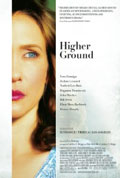
Directed by
Vera Farmiga
109 minutes
Rated M
Reviewed by
Bernard Hemingway

Higher Ground
Synopsis: Growing up in God-fearing America of the 1950s Corinne (Vera Farmiga) knew she had in friend in Jesus. Many years later, after her own baby daughter was saved from drowning in an auto accident Corinne embraces him with profound commitment, but the blows of life – her best friend’s debilitating illness, her disintegrating marriage – cause her question her allegiances.We’re always interested when Hollywood stars takes a sabbatical from Tinsel Town to tackle more bracing, financially less-rewarding fare. What can they do once they step away from the bright lights and pizzazz of the world of entertainment and into a more real, inward-looking place? With Higher Ground, Vera Farmiga, whom most will remember as Alex, the hottie who bowled over George Clooney in Up In The Air (2009), amply demonstrates that’s she’s got a lot more going for her than her calling-card sex appeal. She not only gives an sympathetic performance as a woman going through a mid-life crisis of faith but she also does a fine job as a debut director in adapting Carolyn S. Briggs' autobiographical story, This Dark World, and its account of a life-long search for spiritual meaning.
Given the patriarchal ideology infusing Corrine’s world, even as a grown woman, she is very much within the thrall of her 1950s childhood. In this respect it would not be unfair to describe Higher Ground as a coming-of-age story. From her Sunday school childhood, to her teen pregnancy (these years played by the director’s sister, Taissa Farmiga), and her effective voluntary confinement within a fundamentalist Christian community, Corrine’s life is very much a circumscribed one and Farmiga’s interest, both as director and performer, is with her character’s pressing need to go her own way, whatever the cost..
Although this subject is a universal one, the film plays more to women, or at least, most strongly to the feminine side. Men, if not coming off exactly badly, are certainly sideline players, here, and, even at best, remain relatively, and insofar as they depend on their religious dogma, literally, two-dimensional. Whilst no doubt Ms Briggs’ memoirs are the source of the film’s truthfulness, Farmiga succeeds in carrying this across on screen, particularly in the main part of the film which is concerned with Corrine’s adult life. At times she seems to wear a little too much make-up and be too exceptionally good-looking for a community which is ever on the qui vive for Satan’s work, and, in its latter stages, as a director she overplays her hand, falling back on the dire tendency of mainstream American film to state the perfectly obvious. But outweighing this is a well-crafted, understated and thoughtful production that achieves moments of genuine tenderness.

Want more about this film?


Want something different?




